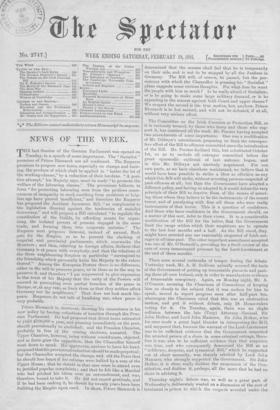The Committee on the Irish Coercion or Protection Bill, as
it is variously termed, by those who decry and those who sup- port it, has continued all the week, Mr. Forster having accepted two amendments of sonic importance. One was a modification of Mr. Dillwyn's amendment, proposing to limit the retrospec- tive effect of the Bill to offences committed since the introduction of the Bill. Mr. Forster declined this, but substituted October 1st, so as to exclude all outrages committed before the great spasmodic outbreak of last autumn began, and in this Mr. Dillwyn not unwisely acquiesced. For our own parts, as we have elsewhere maintained, we believe that it would have been possible to strike a blow as effective as any which this Bill will strike, without arresting persons suspected of past offences at all; but then the Government have adopted a different policy, and having so adopted it, it would defeat the very principle of their Bill to deprive them of the means of arrest- ing those whom they believe to be the instruments of the recent terror, and of paralysing with fear all those who were really instruments of that terror. This is a question of confidence. And those who have confidence in the Government should, on a matter of this sort, defer to their views. it is a cousiderable modification of the Bill for the better, that the Goverument limit the range within which their suspicions are to operate to the last four mouths and a half. AS the Bill stood, they might have arrested any one reasonably suspected of Irish out- rages in all time past. The other important amendment accepted was one of Mr. O'Donnell's, providing for a fresh review of the case of every incarcerated prisoner by the Lord-Lieutenant at the end of three months.


































